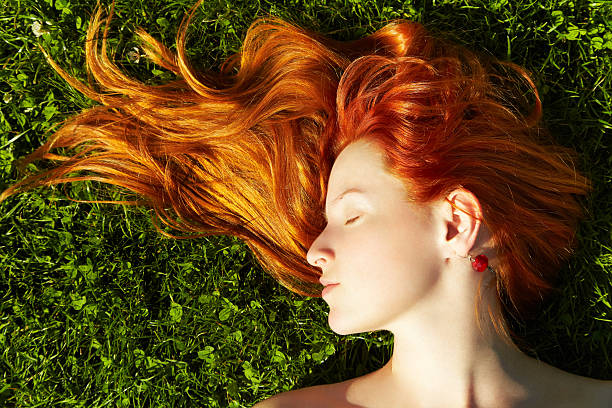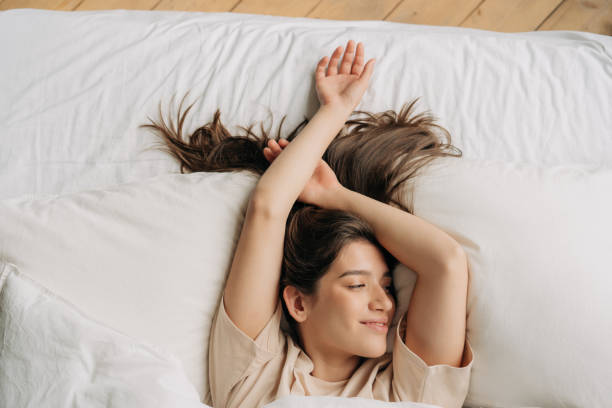1. Introduction
A good night’s sleep is not only essential for our general health, but it is equally important for the Sleep On Hair Health And Beauty. and beauty of our hair. During sleep, our body performs recharging and repair work, which is also important for hair follicles.
During each night’s deep sleep phase, our body releases growth hormones, which support the hair growth cycle. If we don’t get enough sleep, it can affect both hair growth and quality. It’s important to understand that the relationship between sleep and hair health is as deep as winning is with other aspects of our health.
2. Sleep On Hair Health And Beauty

The NAND cycle, characterized by REM (rapid eye movement) and deep sleep stages, is important for hair growth. During the deep sleep phase, our body secretes growth hormones, which nourish the hair follicles and promote hair growth.
If your sleep cycle is frequently disturbed, your body doesn’t release adequate amounts of growth hormones, which can slow hair growth. Lack of sleep also leads to increased stress, which is a major factor in hair loss. Therefore, maintaining a proper sleep schedule and regulating the sleep cycle is very important for hair health.
3. Role of melatonin in hair health
Melatonin is a hormone that regulates sleep and wakefulness. Not only does this hormone boost your mood, it’s also beneficial for hair health. You need to increase melatonin levels, and this provides more nutrients and oxygen to the hair follicles.
Melatonin deficiency increases the risk of hair thinning and premature graying. Consuming natural sources of melatonin such as almonds, cherries, and bananas can also improve your sleep and benefit hair health.
4. Lack of sleep and hair loss
The most obvious symptom of sleep apnea is hair loss. When you don’t get enough sleep, stress hormones such as cortisol go up, which negatively affects hair follicles. High cortisol levels disrupt the hair growth cycle, increasing the rate of hair loss.
In the case of chronic sleep deprivation, you may experience hair loss conditions like telogen effluvium. Therefore, getting adequate sleep and adopting stress management techniques are essential to maintain hair health.
5. Effect of sleep quality on scalp health
A good sleep not only promotes hair growth, but also improves the health of the scalp. When your sleep is full and quality, your body provides essential nutrients and hydration to the scalp. Scalp health is directly related to hair growth and strength.
If your hair quality is poor, scalp dryness, oiliness, and inflammation can occur, which can negatively affect hair quality. To maintain scalp health, it is important to follow a proper sleep schedule and scalp care routine.
6. How stress from lack of sleep affects hair health

Lack of sleep results in increased levels of stress hormones, which can directly affect hair health. Chronic stress disrupts the hair growth cycle, and hair follicles tend to fall out prematurely. Stress-induced hair loss, also called telogen effluvium, is a common problem today.
This stress shortens the hair growth phase and prolongs the shedding phase. Incorporate stress management techniques, relaxation exercises, and adequate sleep to address the problem and improve hair health.
7. Tips to improve sleep quality for better hair health
If you want to improve the health of your hair, you need to improve the quality of your sleep. Here are some simple tips that can improve your sleep quality: First, follow a regular sleep schedule and go to bed and wake up at the same time each day.
During Dussehra, avoid heavy meals and caffeine before sleep. Third, adopt a relaxing bedtime routine, such as meditation, deep breathing, or light imagery. Fourth, keep your bedroom cool and dark until your sleep is undisturbed. Follow these tips to improve your sleep and support hair health.
8. Foods that promote better sleep and hair health.
Your diet also directly affects your sleep and hair health. There are certain foods that are helpful in improving sleep quality and also promote hair health. Almonds, which are rich in magnesium, improve your sleep and support hair growth.
Bananas, a good source of potassium and melatonin, regulate your sleep and nourish hair follicles. Cherries, which are rich in melatonin, improve your sleep and keep your hair healthy. By including these foods in your diet, you can improve your overall health and hair health.
9. The role of sleep in repairing damaged hair

The body’s repair process is very active during sleep, which also helps repair damaged hair. During sleep, Achi repairs damaged body cells and creates new cells, which regenerate hair follicles.
If your need is disturbed, this repair process is affected and hair loss may increase. Adequate sleep provides essential nutrients to hair follicles and repairs damaged hair. So, to cure damaged hair, you should follow better sleep quality and healthy lifestyle.
10. Conclusion:
Finally, the connection between your Sleep On Hair Health And Beauty. A good night’s sleep is essential for your overall health, but it also directly affects the growth and quality of your hair. Incorporating a proper sleep cycle, stress management, and a healthy diet, you want to improve the health of your hair.
Make sleep a priority, not only can you keep your hair healthy and beautiful, it can also improve your overall well-being. Therefore, improving your sleep habits is an investment in your beauty and health that provides long-term benefits.

[…] τα parabens είναι όλα απαραίτητα για αυτήν την κατηγορία περιποίησης μαλλιών χωρίς χημικές ουσίες . Από την ξηρότητα και την ενόχληση μέχρι τη χημική […]